From farting fish to the link between diet and cancer, Kat Arney and Chris Smith take on your questions with Matt Middleton, Giles Yeo and Eleanor Drinkwater...
In this episode

If shivering burns fat, why don't we eat frozen meals?
We put this to Giles Yeo, from the MRC Metabolic Diseases Unit...
Giles - I think the answer is going to be it's probably not a good idea to have your meals frozen. Saying that though, clearly if you shiver, you're using calories and you're using energy but it's probably easier to go for a walk; it's easier to do any number of things. I would recommend eating your food warm.
Kat - My housemate yesterday morning walked in holding a stick of celery and said "I'm detoxing, I'm going to do a detox. I'm just hardly going to eat anything," and by lunchtime she'd cracked and was eating lunch. Do a lot of people just start off with these good intentions?
Giles - What did she eat?
Kat - I think she just cooked up chicken and some vegetables. It was quite healthy.
Chris - Not ice cream. Are they not looking for a bit of a get out clause because they could say, 'it's cold so I'm having to make a lot of energy to warm this up so, therefore, it doesn't count.'
Kat - Is ice cream a health food? Make our day!
Giles - I'm not paid by Haagen Dazs or Ben & Jerry's - other ice creams are available.
Kat - Ice cream not a health food then?
Chris - Giles Yeo, basically it's a 'augh augh.' It's a no from you on that one then?
Giles - It's a no from me.... No. It think it's like saying it's better to drink water to drink water cold. Some people say it's better to drink water warm because you're warm and it's better. Look, we are very well temperature controlled all the way through. It's the same as having a ph diet. Once again, we're also very well controlled on the ph front. Just eat healthily.
Chris - Eat healthily and do exercise.
Giles - Absolutely!

Why is a duck tapping on my window?
We put this to Eleanor Drinkwater, from the University of Cambridge...
Eleanor - Well it's a really difficult thing to say without seeing the ducks themselves but I'd say it could be down to two things. One if there was a nice reflections of a duck on the other side. Ducks can't recognise their own reflection. The only bird known to recognise their own reflection is, actually, magpies, so it could be thinking there's another duck there.
Alternatively, if you've ever fed it before, it could be coming back to try and check out the scope and try and persuade you to feed it something else.
Kat - Has anyone noticed this with ducks - has anyone got ducks in their garden?
Giles - Because I was asking you, I think, before we came in here whether it's the same reason as with crows? Because we had this crow on the top of our house once just tapping at he window and we had to put these little spiky things up to stop them from actually coming in.
Chris - I think Eleanor's point about the reflection is the one because our next door neighbour has a window that, at certain times of the day, it reflects the sun and the birds sit on the window sill and tap on that round window. And, I think, if you look I can see a reflected bird sitting and I think they probably catch sight of themselves as they go past because birds have got fiercely good vision, haven't they, Eleanor?
Eleanor - Yes.
Chris - And so they're probably trying to attract this predator that's invading their patch.
Kat - And then there's also the reverse problem isn't there? Because my mum has big patio doors and before she put some big stickers of birds on them, because she used to get poor little things flying straight into the glass because they couldn't see it. Is that quite a big problem too?
Eleanor - Yes, birds flying into windows is a really big problem. And, in fact, there's some really cool research that's going on, as birds can see in UV and we can't. So there's some really cool research going on to kind of put some stripes across the windows and all sorts of different things to make marks that the birds can see that we can't.
Kat - Oh wow! So you could have like a scary UV bird that instead of obscuring your vision with a sticker?
Eleanor - Yes, well that's the idea.
Chris - I think the duck was just quackers!
Eleanor - That's the other alternative.
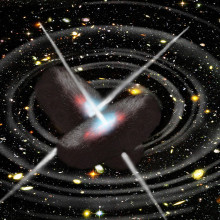
What would happen if I flew through a gravitational wave?
We put this to astronomer Matt Middleton from the University of Cambridge...
Chris - Now this happens on Star Trek a lot, so I'm really interested to hear the answer to this.
Matt - What?
Chris - People flying through a.
Matt - ...gravitational wave?
Chris - Well, an anomaly in the space-time continuum?
Matt - OK.
Chris - It happens a lot and Jean-Luc Picard's hand went all funny in a fruit dish once and I always wondered how one would argue that from a physics point of view.
Kat - I think we've identified the Trekkies in the room!
Mat - Singular, singular! OK, so obviously a very pertinent question given that LIGO has directly detected gravitational waves...
Chris - LIGO?
Matt - LIGO is the Laser Interferometer Gravitational Wave Observatory, and they detected gravitational waves for the first time, and these are formed when black holes merge. They can be formed in other ways too but that's what's been discovered from LIGO. So these waves, they propagate outwards and they're crashing through us all the time. Right now, gravitational waves are going through us. We don't feel them because the...
Chris - I don't know, I went to the curry house last night and I've had gravitational waves afterwards!
Matt - Oh that's beautiful - what a lovely image! The strength of gravitational waves falls away inversely with distance and, because these things are astrophysical in origin, the gravitational that cross us are infact very very weak. And in fact, LIGO had to detect the Sun moving by the width of human hair. That's how accurately they had to do their measurements. That's absolutely phenomenal!
What essentially happened though is that if you add two particles together and a gravitational wave goes through them, they'd be pulled apart and compressed at the frequency of that wave. It would be like a tidal force when the moon goes round the earth, so pulls and pushes, stuff like that. So in terms of time though, the effect is extremely minimal.
Chris - But does it actually do anything different to your body? Does that mean, literally, parts of your body are experiencing time slightly differently as the wave goes through you?
Matt - Time... probably not. The time dilation effects are going to be extremely minimal but in a physical way you would feel a tug. It would be like a tidal force so as if you were.
Chris - But a very small one?
Matt - Very, very small for us. If you got very close to the black hole, then there would be a huge tidal force but then your days about to get much, much worse! I don't know if that was on Star Trek? And then you are in a seriously different realm of time dilation effects.
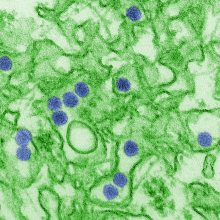
How long does zika remain active?
We put this to Naked Scientist, Chris Smith...
Chris - Yes, these are all really pertinent questions, which we don't actually have gold standard answers to yet. But it is a big problem and, based on the paper from Andy Tatum's group at Southampton last week in Nature Microbiology, they're saying that 93 million people are going to get infected with Zika in the next two years in the Americas, and there'll be 1Ã?,½ million women who are currently bearing children in that group of individuals. So there's going to be a lot of exposures going on and those are people who catch it when they are pregnant.
Now we know that's a risk because when you have virus in your bloodstream, it can get across the placenta, which is normally a very good barrier and stop it getting in. But, with this virus, it can cross the placenta and it homes in on the stem cells that make your brain, as well as other tissues, and it damages those stem cells. So that's why it causes harm to a developing baby.
The thing people are really worried about is whether or not it can lurk in the body and stay there so that, although you've cleared the virus, you could succumb later or your pregnancy could be harmed. The evidence is that if you're female, you catch Zika, your immune system kicks in, it kicks it out and you clear it after a week or so, and you do not have any virus that's going to cause a subsequent pregnancy with any problems because it would have to get across the placenta from the blood and there's no virus in the blood.
Where the threat comes from is that your partner could, if he catches Zika virus, retain virus in certain body fluids for an extended period of time. We know that there have been sexually transmitted cases of Zika, anything up to several weeks after the person stopped having any symptoms or any virus in their bloodstream. So the worry is that people could think that they're actually fit and healthy and they've recovered from it. Or they may not even have had any symptoms of Zika in the first place because 80% of people don't even know they've had it, and then you transmit it to your partner, she catches it and she then gets the virus in her bloodstream and it then goes into the baby. We don't think there's any risk of the virus going from the genital tract directly up into a baby.
Kat - I think it's probably best just never to have sex again!
Chris - Well... I'll leave that one to you Kat.

Is obesity genetic?
We put this to Giles Yeo, from the MRC Metabolic Diseases Unit...
Giles - There is definitely inheritance of body weight and body shape. The question, however, appears to assume there's only one inheritance, one inherited possibility but there isn't. It's not just one gene, it's not just one fat gene. We now know of over 100 genes that actually involved in determining your body size.
The second part of the question about the role of the environment. That's a very good one because our genes haven't changed, certainly over the past 30 years, whereas obesity has skyrocketed, and that is down to the interaction between your genes and the environment. I think the analogy I alway use is that if two genes (two people) are standing side by side, they look exactly the same. Suddenly an environment comes along, say me, and I give someone a shove and the other one not a shove, someone will fall over and someone won't, and that's because they're interacting with the environment in a different fashion.
Chris - In our sort of caveman era, we would have had enormous advantage conferred upon us if we had genes that made us store energy for a rainy day. Whereas now, you have Waitrose, Tesco's, Sainsbury's, other supermarkets are available just down the street and you can go in there any by anything you want.
Giles - It's not only walking in to do, you can now order anything from your smartphone.
Chris - That's true and you can have it delivered to your house, can't you?
Giles - Exactly, you don't have to get your bum out the door.
Chris - So you can be physically too big to get out the door and you still get fed, which means it become maladaptive, doesn't it?
Giles - That's correct.
Kat - And one of the really fascinating things. I've just been making a radio programme looking at how changes really early on in development affect the health, the lifestyle, and even the weight of people much, much further down the line. So there is the important role right at the start of development, maybe even before a woman knows she's pregnant herself, that there could be influences there from the mother, and maybe if the mother's not got enough food.
There's a very famous example of a famine in Holland during the Second World War, where the babies were exposed to this famine very, very early on in the womb and they came out kind of OK, but then later on in life they were fatter. Maybe because they thought, oh we're starving here, we'd better make the most of everything we've got.
Giles - So what you were referring to is known as the "Dutch Hunger Winter," and the field of studying this is "in-utero programming." And what that studys is, when you're actually carrying a baby, is there any programming that happens, and there is. And the reason there is is because what you want to do, as a foetus, is to predict what the environments going to be and get yourself set up the best way that you're going to be.
You've got genes which don't change, but if you actually change the markers on the genes, it actually changes the way genes are turned on and genes that are turned off and so there is definitely evidence for that.
I have to say though that the evidence for the obesity side of things, and programming is not huge. The evidence for type 2 diabetes, and insulin resistance, and other metabolic diseases. definitely, definitely so. And more scarily, people are now beginning to say, before you even become pregnant is that having an unhealthy diet can actually influence your egg and your sperm. Not together in the same person, clearly but an egg and your sperm.
Chris - It would be very strange if you did.
Giles - But there are now studies happening of how can an unhealthy diet or lifestyle influence your egg and your sperm.
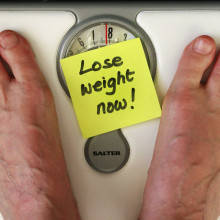
How does metabolism change?
We put this to Giles Yeo, from MRC Metabolic Diseases Unit...
Giles - Well, let me see if I understand the question. I mean the biggest influence on your metabolic rate is still going to be you size. So the larger you are, the higher your metabolic rate, oddly enough, and the smaller you are the lower your metabolic rate, so there's that. However, what happens when you lose weight, and you lose a lot of weight, your body (your brain in particular) does not like that. And so what it does is it tries everything it can to stop you from losing weight and one of the things it does is to slow down, ever so slightly, your metabolic rate and, also, increase your food intake to try and make you gain the weight back.
Chris - But does that persist indefinitely? So, if I lost a lot weight, and I changed my lifestyle, would my brain for the next 55 years still be trying to get me back to the state I was in before I lost weight or would it slowly adapt and learn that the new slim me was the way I wanted to be?
Giles - Well, I'll give you the depressing answer first. The depressing answer, as far as it has been measured. Now you can imagine trying to do that in a human being is pretty tough. But all of the experiments that have been done over a couple of years, where they've held someone down at a specific weight after having lost, unfortunately your brain, certainly through that time tries to pull you back up to that weight that you once were.
Chris - There's going to be a lot of sorry people out there now, isn't there?
Kat - I have heard that it's really hard to do these kinds of studies because people lose weight and then they just put it back on again. Very, very sad!

Do snakes bond with their care givers?
We put this to Eleanor Drinkwater, from the University of Cambridge...
Eleanor - Well, the cool thing about this is no-one's ever done any studies on this at all. So, I called up one of my friends called Dr Miller, who's currently in Honduras taming baby jaguars (as one does), and what his view was. First of all snakes tend to have a terrible sense of eyesight so they wouldn't be able to tell that Anna was blonde and beautiful. However, they do have this amazing sense of taste. So they kind of stick their tongues out and taste whatever particles are floating around the place, so it's not beyond the bounds of possibility that they could tell Anna from Jacob, or Jason, or whoever else is hanging around the place.
However, the really interesting thing though is with a few wonderful exceptions, including iguanas, most reptiles tend to be pretty a-social. They're not like dogs that are pack animals and they want to hang out together, whereas snakes don't really care. So the thing is there's probably no pressure for the snake to form a bond with Anna because there's not real kind of bonding with snakes in the wild.

How many genes do humans share?
We put this to Naked Scientist Kat Arney...
Kat - And this is a great question, but it's sort of based on a misunderstanding. Because this is a phrase that we often hear that humans, we share 99% or 99.9% of our genes with each other. And, actually, if you took two random humans, there would be 4 million differences in the letters of our DNA. These chemicals called bases (they're like the letters of the alphabet of our DNA).
But the key thing is that the way John's phrased this question. It's like if you imagine our genome as a recipe book that makes all the recipes that our cells need, you're imagining that we would have say 250 recipes, whole recipes that were different between us. That's not the case. It's more like there is 0.1% of 4 million differences in single letters (kind of typos) scattered through the whole of this recipe book. And, obviously, between males and females (people who are genetically male and genetically female), there's a whole chromosome difference.
So the two women in this studio, myself and Eleanor, we have two X chromosomes whereas the chaps here, I'm assuming, have and X and a Y chromosome. I haven't karyotyped everyone - I don't know for sure, but that's my assumption.
So basically, it's not that we have whole genes that are different, there's this kind of smattering of variations through the whole thing. However, some people do have changes, mutations, variations that do mean that whole genes, or even whole chunks of DNA are missing, or even whole bonus chunks. In Down Syndrome, you've got a whole extra copy of one of the chromosomes. So there are lots of variations between us but it's not like saying this whole gene is there, this whole gene is different.
Chris - Is it a bit like - you used a recipe analogy Kat - so you're making a cake and it says you've got to have the flour, and the eggs and the margarine, and the raisins, and so on. And rather than getting your raisins from that shop, you've gone and got a sort of different type of raisin. They're still raisins but they're slightly different raisins and, therefore, the recipe you cook up will make a slightly different cake but it's effectively still a fruit sponge?
Kat - Yes. Or it could be raisins versus sultanas, or oranges versus lemons. And, actually, just in our own genes we have a lot of variations. We make, if you think of it in terms of recipes, we make several hundred thousand different recipes called "proteins" that make ourselves function, keep us functioning healthily, but we only have about 20-25,000 genes. So there's a lot of switching in and switching out anyway, and these tiny, tiny variations scattered between them make us all unique and different.

Why does Venus have an atmosphere?
We put this to astronomer Matt Middleton, from the University of Cambridge...
Matt - So, a magnetosphere is incredibly important - the Earth has one. The Earth has one because we have a molten core that rotates, generates a magnetic field, a dynamo, and this magnetic field deflects particles that are coming to us from the Sun's highly charged magnetic particles. Now, if we didn't have a magnetosphere, the interaction would start to remove ions from the ionosphere, so our atmosphere would get leaky.
Now Mars doesn't have a magnetosphere; it used to probably around 4 billion years ago and we're not entirely clear why it went away. Now it's not just because it lost it's magnetosphere and everything just 'woo' off it went into space - that's the noise it makes actually. But, actually Mars is much smaller than the Earth and it has a gravitational field of roughly around 36% of Earth's, so holding onto stuff is actually very, very difficult.
Now if you go to Venus I would have to correct one of the things that was said. You're right, it doesn't have a magnetosphere but it has got something. It has an induced magnetosphere because the magnetic field from the Sun wraps around it, so it has some protection from the.
Kat - Is that because it's so close to the Sun?
Matt - Yes.
Kat - OK. So it's sort of hogging a bit of magnetic field from the Sun?
Matt - Yeah, yeah. Because magnetic fields are slamming into Venus and wrapping around so you end up with a sort of quasi magnetosphere.
Kat - Like a magnetic cuddle?
Matt - A big magnetic cuddle. That is the cutest thing I've ever heard in terms of planetary astrophysics.
Kat - And its holding some gas onto it like an atmosphere.
Matt - That's cute! Ah, I see a brand of toys emerging here. And Venus is very similar to Earth - it's essentially our twin planet. So it's heavy and that means it holds onto its gas so that is why it has more of an atmosphere.
Kat - Because of the magnetic cuddle.
Matt - Because of the magnetic cuddle.
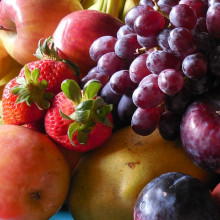
Is our overconsumption of sugar an evolutionary hangover?
We put this to Giles Yeo, from MRC Metabolic Diseases Unit...
Giles - If I may Mark, it is not true that fructose is converted to fat and little else. Undoubtedly glucose, which is our normal fuel that increases insulin and everything else, that is absorbed by your muscles and your fat and that's not true for fructose. It goes largely to the liver where it's actually metabolised there. Only about 1% or so, or slightly less, goes directly to fat.
Chris - What happens to the other 99% then?
Giles - It's actually divided between glycogen and actually being converted to glucose in itself. There is, however, a variation in how people handle fructose. OK, so some people handle fructose slightly better than others but, at the end of the day, all things will be converted into fat if you have to much of it. So, even if you have too much glucose, once your body uses up the glucose it needs to use, it will be converted to fat. The same thing for protein, the same thing or fructose as well.
Chris - So does Mark have a point that you have this big glut of fructose at one time in the year and it does end up as fat because, effectively, animals are taking in more energy that they need so it favours becoming obese?
Giles - But it's not only fructose. I mean fructose is found largely in fruit, but together with glucose, they form sucrose. It's sugar in itself - too much of it when you have too much of it will be converted into fat. That is the purpose of having that glut where the bears come along having the fruit in order to actually get enough energy to hibernate. But that's always going to be true if you have too many calories in which sucrose is readily available.
Chris - Eleanor.
Eleanor - Just quickly from an animal tasty thing. I was ready quite recently about taste perception and why are sweet things tasty. And from looking at birds it seems to be that it evolved to teach them that this is lots of calories therefore it's worth eating, therefore it's sweet, so that's the kind of evolutionary thing. Is it the same in people do you think or do you think it a bit more complex?
Giles - No, no. I think it is quite that simple. Sugar is one of the most energy dense things we can have per gramme because you get 100% of the calories from it. And interestingly, if you take babies, they can take food that is sweet, that is incredibly sweet that we would find inedible, but babies will go, um delicious, yummy. And then what happens is as they get out of babyhood into childhood, then into our age when our palate becomes adult-like, we can't take food that is as sweet as our kids can. And if you actually taste anything the kids eat - oh my god!. And so I think it's quite that simple - yes.
Chris - Wasn't you who said once Kat - I love babies but I couldn't eat a whole one?
Kat - Yes, yes, I think they're sweet. Too sweet for me.
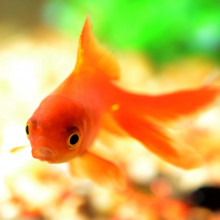
Do fish fart?
We put this to Eleanor Drinkwater, from the University of Cambridge...
Eleanor - I think this is a fantastic question. I absolutely love this question, and I can say categorically that some fish do fart. In fact, a recent study discovered for the first time that herring fish produce farts (fart noises), which they think they use for communication.
Kat - Herrings talk to each other by farting!
Eleanor - Apparently. They discovered that if they put more and more fish into a tank together, the increase in fart noises would increase disproportionately to the number of fish.
Chris - When you say fart noises. So you literally mean as in farting noises?
Eleanor - Well, yes. It's a small jet of air which comes out of the anus.
Chris - Where do they get the air from because, as is pointed out in the question, fish don't breath air and when we swallow air, some of it emerges at the back end and the bugs in our gut metabolise some of it to gas so, where do the fish get theirs?
Eleanor - Different fish are kind of put together differently. In the case of herring fish, they have their swim bladder, which is a little sack of air that helps them with buoyancy around the place under the sea, is attached to their gut. And they can actually gulp air in from the surface and they do produce a little bit of gases themselves, which then go from there into the swim bladder. If the swim bladder gets too full, they want to change depth, they can then spit some of the water back out. So yes, that's where the herring get their farts from.

Why am I so constipated?
We put this to Naked Scientist Chris Smith...
Chris - It sounds uncomfortable doesn't it. Well look, this is actually pretty common so I thought we could have a little quiz because, actually, you might think this is something that only everyone else suffers from but, in fact, many people do get constipated. And I thought we could have a science fact, or science fiction around constipation or, in this case, I suppose we're talking whether it's dogma or dog muck.
I'm going to read you some statements and you have to tell me whether you think it's true or false. So everyone's involved, no-ones off the hook.
Right, so here we go. First one:
The majority of healthy people have a bowel movement every day. Is that science fact or science fiction do you all think?
Matt - Fiction.
Giles - Fact.
Chris - Matt says fiction. Giles does every day.
Kat - I'd say on average.
Chris - Actually it's false. Only about 50% of the normal population poo daily. How often are you going then do you think Matt?
Matt - Well, I've just come back from a stag do, so several times an hour!
Chris - OK. Question two:
Toxins accumulate in the intestine when bowel movements are infrequent. Is this true, fact or fiction?
Kat - Well I think we're coming back to the handover poo here as well. But I would - it is a really good way of getting nasty stuff out, so I would say yes.
Chris - Speak for yourself Kat. Eleanor?
Eleanor - I'd say fiction.
Chris - Giles?
Giles - I would say fiction. I think your liver probably does most of the toxin removal.
Chris - Yes, it's a fiction. There's no evidence that toxins accumulate when bowel movements are infrequent or that constipation actually leads to disease.
Kat - I'm sucking at this - I really am.
Chris - OK. Chronic constipation affects about half the population. Fact or fiction?
Giles - If half the population don't poo once a day, I'm going to say fact.
Chris - Kat?
Kat - Well, I seem to be getting all of these wrong so I'm going to go with Giles.
Chris - Fact. Matt?
Matt - Fiction.
Chris - Matt's pretty emphatic about that!
Eleanor - Yes, I'm going to go with fiction as well.
Chris - It's false! It is actually very common though being constipated. About one person in five is a sufferer of regular constipation.
Kat - 20%.
Chris - 20% yes.
Right - exercise, fluids and the right foods prevent constipation. There you go.
Kat - But that's what our listener says. She's exercising, she's eating..
Chris - That's the question I'm asking you - is that true or is it fiction?
Kat - Oh. Well clearly it's not working for her.
Eleanor - Can there be some of genetic predisposition or something maybe?
Chris - Well, the answer is actually false. Because those things do contribute but, actually, psychology plays a very big role.
Eleanor - Really.
Chris - Also medical conditions: Parkinson's disease; classically people who have Parkinson's often get problems. And also people with an underactive thyroid often get problems in that department. And people who use drugs such as codeine, so painkillers they are very, very constipating.
So how do you sort his out. Well your bowel has as many nerve cells in it as your brain. In some people's cases it has more nerves than your brain. So actually it can learn and when people talk about habit, this actually is very true. Your bowel learns your pattern of eating and it learns when you tend to need to make space and egest stuff (throw stuff down the toilet). So get into a habit is the advice. Go to the toilet regularly at the same time, but anything between once a day and about once a week is, actually, known to be compatible with good health and most people think themselves into a state of worry when they don't need to worry. So you're alright Kat. You're OK.
Sorry Matt.
Matt - I would point out that if you are really struggling - strong German lager is also highly effective.
Chris - The other thing they say is don't ignore the urge to go because there are people who are dubbed 'annaly retentive' for good reason, which is: they're busy doing something else and they think I won't go - I could go, but I won't go because I'm busy with this. And that's really bad because what it does is it detunes the response of your gut, it senses stretch and it knows when you need to go and, if you blunt that reflex, you're more likely then to store up trouble for yourself, quite literally.
Also reduce stress because psychological distress, actually, can manifest in a range of ways either going too often or not going enough.
Drinking plenty of fluids does make a difference because if you are really, really dehydrated it can make things harder and harder to go.
Also increasing dietary fibre is a good idea because that does have a promotility effect in some people.
And don't abuse laxatives because there are some people who think they've got something wrong, so they start taking lots of laxatives, and the laxatives make them go but then they become laxative dependent . And it's a good idea not to do that but to resort to other things.
I think that the bottom line here (excuse the pun) is that it's not so much how often you go that's the problem, it's if something changes. And what doctors like me are interested in (not at parties) but if you come to seek my advice professionally is, we're asking you not how often do you go but have you noticed any change. Because what's normal for you; we're all different; everyone has their own sort of bowel habit, but it's when it changes all of a sudden having previously been established. That's when we worry.
So if being a little bit constipated is normal for you, consider some of these simple things that might help to improve matters but don't panic unless something has suddenly changed.
Kat - So Naked Scientists getting to the bottom of all the important issues!
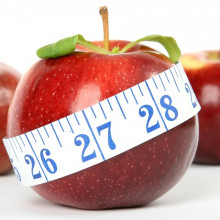
How efficiently do we use calories?
We put this to Giles Yeo, from MRC Metabolic Diseases Unit...
Giles - It's a very good question. In essence is every calorie a calorie? From a physics point of view, clearly a calorie is a unit of energy so every calorie is a calorie.
Kat - Could we just unpack what is a calorie?
Giles - A calorie is the amount of energy you need to raise 1 litre of water by 1 degree. That's correct - I'm getting the thumbs up.
Kat - So it's literally how much energy is in this particular amount of food?
Giles - Yes.
Kat - So that's calories. So a calorie is a calorie, is a calorie, or not a calorie?
Giles - A calorie is a calorie once you actually get access to it. It's all about caloric availability. Let me give you the example: 100 calories of sugar - you would get 100 calories out of it because it's our base fuel. 100 calories of sweet corn - now anyone who's ever sweetcorn, and given the topic of the conversation had a peak down the next day can see that you do not digest 100 calories of sweet corn. If you take that sweet corn, however, and actually dry it up and impound it and make it into like a cornbread, then you get a lot more accessibility. So how you actually treat the calories, the type of calorie, and in what form it is, gives you different caloric availability and, therefore, people think different calories differ, which they do from that perspective.

Why did I see two suns?
We put this to physicist Matt Middleton, from the University of Cambridge...
Matt - Aliens!
Kat - OK. Right, next question. moving on.
Matt - When's the next question on poo coming up. Right.
Sandy - you're not mad. The scientific name for what you say is parhelia; they're commonly referred to as sun dogs. The earliest reference I can find to this was from Aristotle who died in 322 BC, so these have been documented for a very long time. I don't know why nobody else saw it, perhaps they weren't looking at the right place in the sky.
The reason that you see these things is refraction of light. We're all familiar with refraction of light, we've all seen rainbows. We probably, as a child, had a prism or something like this or maybe cooler toys. Maybe my parents fobbed me off with something pretty weird...
Kat - Cooler kids have cooler toys than just prisms.
Matt - Essentially, it's refraction of light. So light bends as it enters a medium of a different density. What happens is if it's very, very cold you get crystals forming in the atmosphere and they act as prisms, so they bend the light rays as they pass them. So, as these crystals float downwards and the horizontal faces become more edge on, you see the light refract horizontally, so you see them to the left and the right of the sun. And those are sun dogs.
Eleanor.
Eleanor - How often does this happen - how have we been missing this?
Matt - Well, I don't think they've been missed, but you do have to have a certain combination of weather to actually get those. So again, it has to be quite cold so you will see them quite often in winter and it probably also helps that the Sun is quite low on the horizon as well. So you do see them but we just don't see them all that often.
The other thing to remember is that you're refracting light around so those two mini suns won't be as bright as the main boy so they are a little bit fainter.
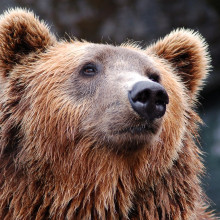
How do bears know when to hibernate?
We put this to Eleanor Drinkwater, from the University of Cambridge...
Eleanor - Well first of all there hasn't been a huge amount of studies on bears, unfortunately, on hibernation because of the difficulty of bothering a bear when it's trying to sleep. But there has been this great study done on brown bears and they found that first of all, bears just tend to slow down in autumn until it hits a specific time before the denning period in which they go into almost beginning to shut down. So they tend to move around really slowly and they found that 50% of bears would start doing this while they were still quite a long way away from their den and the other 50% would wait until they were closer to the den to start doing this. It's difficult to tell because, obviously, you can't ask a bear "are you feeling sleepy?," but the wind down suggest that they're going into the sleep phase.
Also the other interesting thing too is that, apparently, during this period this is when brown bears are most dangerous. There's the greatest number of unfortunate encounters between brown bears and hikers because they reckon it could be that the bears are kind of sleepy, and they can't run away as well, so they tend to get a little bit more aggressive.
Chris - Giles?
Giles - An animal model which is being studied, is the siberian hamster. And what happened there is you get a fluffy white siberian hamster during the winter and then they become lean and mean and thin during the summertime.
Chris - A mean hamster - why are they mean?
Giles - To go after the acorn! The critical thing is scientists can induce changes in these animals just by changing the time of light. So if you go from 8 hours of light to 16 hours dark, you will then have a winter hamster and if you actually switch it around, you will end up with a summer hamster. So you are actually able to change this. I don't know if this is true.
Chris - The light day length is the trigger for initiating... pathway kicks in to say you need to be thinking about going to bed now?
Giles - Correct.
Eleanor - That's so cool. With bears they found that they correlated with the amount of food present and what the temperature was but I don't know whether if you put bears in a box and changed their patterns. I know with lizards.
Chris - I'm sure they'd be delighted! I'm sure they wouldn't mind at all!
Eleanor - Well, you never know.
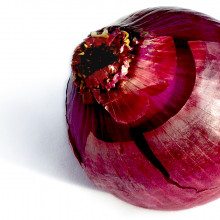
Could a vegan diet prevent cancer?
We put this to Giles Yeo, from the MRC Metabolic Diseases Unit in Cambridge...
Kat - So this is a really, really complicated question because, unlike a behaviour like smoking or even drinking alcohol, everyone has a different diet. Everyone eats different amounts of food, all sorts of different types of food, it's different in different parts of the world and, as we heard earlier from Giles, different people have different genetics, and respond differently to the food that they eat. So it's really, really hard to unpick all of this.
Now there are a couple of massive studies that are going on. There's a huge study called EPIC, which is the European Perspective Investigation of Diet and Cancer. I know that Cancer Research UK is helping to fund a big part of that and there's sites in Oxford and Norfolk where they're looking at thousands of people, and in total I think it's half a million people in Europe where they're saying, OK what do you eat, how do you live, how does this affect your risk of cancer and other diseases as well? They're looking at things like diabetes and heart disease.
Now there are a few broad brush things that EPIC has pulled out in terms of diet. So in terms of specific types of foods it has shown that the more red meat, and particularly the more processed meat you have in your diet, the higher your risk of certain types of cancer, and particularly bowel cancer is one of them. If you eat more fish, you have a lower risk of bowel cancer. If you eat more veg, more fibre in your diet, broadly that reduces your risk of certain types of cancer, particularly bowel cancer, and also there's a big part of just your overall body weight. So we know that the more obese you are that does increase your risk of cancer too.
The exact components of the diet and whether being specifically a vegetarian or a vegan is a lot more hard to unpick, particularly because in the studies there aren't that many vegetarians and vegans. So one of the things we do know is that there seems to be a link between a particular growth factor. Something called IGF or insulin-like growth factors and your risk of cancer. That may be linked to animal products, may be linked to dairy. There's a lot of work trying to go on and unpick this but you hear a lot about stuff about - oh there are places in the world where they're completely vegan and they have no cancers at all - that's probably not true
The link between diet and cancer is very complex but broadly, the main things we can say is the more fruit and veg you eat , the more fibre you eat, the less red and processed meat you eat, fish is good, less alcohol is better. Those will broadly help to reduce your risk of cancer as well as keeping physically active and trying to keep a healthy body weight.
Chris - What about smoked fish because I love that?
Kat - Oh yes, so.
Chris - I couldn't not have that.
Kat - So there's a couple of interesting things about. I think smoked fish comes under processed.
Chris - Because, you know, someone did write to me and they said "Chris, I don't understand why smoking is bad for you if it cures salmon."
Kat - Ha has - the cure for salmon! Yes, I mean certainly that comes under processing. We do know that, for example, particularly in Japan where they have a lot of very salty foods and a lot of pickles, that certainly does seem to be associated with an increased risk of stomach cancers. And also, stomach cancer's really interesting because the rates of that, particularly in the West, have gone down massively because a lot of that is linked to 'gone off' food, and the sort of nasty chemicals produced when food goes off. And as everyone has a fridge now, you're much less exposed to those kind of nasties and that's helped to reduce the risk, particularly of stomach cancer.

Can varicose veins be prevented?
We put this to Naked Scientist Chris Smith...
Chris - Right well, what is a varicose vein? This is common; about half of men and half of women are destined to get varicose veins. The evidence is women will get them slightly younger than men. They are bulges or dilatations in the veins often seen in the legs, and the reason for this is the pressure is greatest in veins in you longest part of your body and your dependent tissues.
So, if you imagine yourself standing up, you've got all of the mass of the blood in that column of blood vessel, which goes from your big toe right the back up to your heart, pushing down on your veins. Veins aid the return of the blood to the heart because they have valves in them and those valves allow one way flow. And every time you contract a muscle you squeeze the vein, and this applies a pressure to the blood and it pushes blood through the valve, and it moves it back up to the heart.
Now eventually, some of those valves fail a bit and so, instead of there being a short segment of water pressure pushing down on each segment of the vein, you can end up with a long column of water pushing down on one bit at the bottom of the vein. So the pressure on the wall of that vein can become quite high and it leads to that segment of the vein beginning to stretch or dilate and become torturous, and you often see this happening on the lower limb because that's where the pressure is highest.
We know that they tend to be more common in people who gain weight. We know that pregnancy is a risk factor, probably because you gain a bit of weight but you also have more pressure on your venous system. We also know that family history seems to play a role. If you have a family history of people getting varicose veins, especially at a younger age, you are more likely to succumb to them yourself, but that's not a given.
How can we treat them? Well, you can stop them happening in the first place up to a point if you minimise your risk factors. You can minimise your body mass index, which is a big risk.
Kat - Does putting your feet up a lot help?
Chris - It doesn't really seem to, no. There's not really any evidence that being lazy does help. Probably because you gain weight and so one thing begets the other.
The other thing you can do though is have surgery, and what you do is a strip of the vein and looks pretty nasty and it is pretty nasty. What you do - and I've done this operation - you take someone, hopefully anesthetized and asleep; it would be very painful if you didn't have them asleep. You thread a cannula up from the bottom of the vein right up to where it joins the vein at the top of the leg, and it's got a big bulge on the end of this cannula. This big thing - it looks a bit like a mini torpedo and once it's come out of the end of the vein you then yank back and strip out the whole of the vein all the way back along it's course.
Kat - Ewww!
Chris - And rip it all out. And you rely on the blood then finding other routes back up inside the body and that's called a stripping. And also the little ones, the little perforators, you do a multiple stab through the skin and whip them out and they just thrombose off. If they are a big problem you don't have to resort to surgery. What people sometimes do is wear those stockings called TED or thromboembolic deterrent stockings which are elastic stockings and they apply pressure across the wall of the vein, stopping the vein stretching and dilating. But, unfortunately, not everything improves with age and your risk of varicose veins is one of them.
Sorry Kat.

Are dairy and alcohol intolerance linked?
We put this to Giles Yeo, from MRC Metabolic Diseases Unit...
Giles - Ah. They are not linked genetically and their apparent linkage in the world in various ethnicities, is entirely coincidental and it actually has to with the history of agriculture within that particular region. So milk: most of the world cannot handle milk - people don't know this. So most people are, actually, lactose intolerant or are unable to handle lactose once they become adults.
The reason why the ability to lactose has evolved is because three different populations, in particular, Northern Europeans and two different African tribes figured out that if you don't kill the cow, the camel or the goat immediately and eat the meat but drink the milk, you actually get a lot more calories out of them. That's the first thing.
The second thing is that milk provides a very safe drinking source and so, for people who are able to take advantage of this, they thrive.
You might ask why a lot of the world are not able to handle milk. I'm Chinese, so I will use the Chinese example. And the reason why is they had their own other sources of calories and the Chinese, for example, were the first people to domesticate chickens, and so then, chickens came with eggs and they were able to do that. And the Chinese were the first to domesticate pigs and we don't drink pig milk, eek!. So, therefore they do that.
Chris - I thought you were going to say they were the first to come up with crispy duck as well because that is also fantastic!
Giles - Poultry or in general. In terms of alcohol. Alcohol, once again post agriculture, and people were able to drink and people have always drunk it for cultural reasons. The reason why some cultures are able to handle it more than others however, has to do with safe drinking water. So the Northern Europeans and the people in the fertile crescent, so the Middle East, chose to purify their water by adding alcohol and so that it was then became safer to drink it.
Chris - Choice!
Giles - Mmm. So they had to be able to metabolise it well enough to drink it otherwise they would die. The Chinese, amongst other groups, choice to boil the water and end up sticking some twigs in it and call it tea. Although they did drink alcohol, their survival did not rely on alcohol.
Kat - So those genetic variations for lactose tolerance, and alcohol tolerance, have just become selected in the populations that have loads of dairy and loads of booze.
Giles - Correct.

Do birds go somewhere to die?
We put this to Eleanor Drinkwater, from the University of Cambridge...

Could I see the end of the Universe?
We put this to astronomer Matt Middleton from the University of Cambridge...
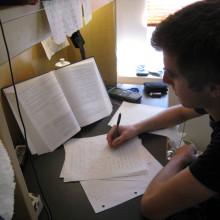
How easy is it to pursue a science career later in life?
We put this to our panel of scientists, including Giles Yeo, Matt Middleton and Eleanor Drinkwater...










Comments
Add a comment